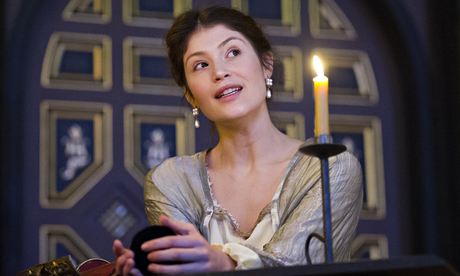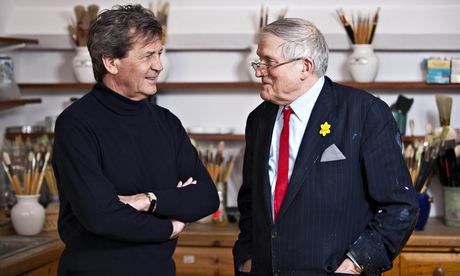A very interesting article from the always erudite Mark Lawson:
For the original article click here
British TV is learning to love the arts – but it can love them too much
TV's new passion for the arts should be good news for culture enthusiasts. But are critical voices being drowned out by applause?

Gemma Arterton in the Globe theatre's production of The Duchess Of Malfi, which is to be screened on BBC TV. Photograph: Tristram Kenton for the Guardian
In the history of television, the areas of British life that have most regularly complained about the lack – and, in recent times, reduction – of airtime are religion and the arts. But, while bishops may still be bitter, artists now seem to have cause to applaud. This week Channel 4 announced a large increase in its arts programming, just over a month after BBC director general Tony Hall revealed the ambition to put arts "at the heart" of the schedules.
The broadcasters will hope for an unreserved cheer from producers and consumers of culture, but there is reason for concern that the type and tone of coverage being promoted may prove rather more beneficial to the creators of the arts than to those who have to pay to see them.
Channel 4's new commissions include, for example, Random Acts, a showcase for short films by visual artists and film-makers, which is a collaboration with Arts Council England (Ace), an organisation that also featured in the BBC plans, as co-funder and co-producer of The Space, a website on which, again, brief films will be screened.
These cases of Ace teaming up with TV are examples of the current fashion in cultural broadcasting for "creative partnerships". The BBC has announced co-productions with institutions including the National Portrait Gallery, Tate Britain and the National Galleries of Scotland. The biannual Manchester international festival will become another "creative partner", with its director, Alex Poots, becoming one of a number of creative figures who will advise the BBC on its coverage. Sir Nicholas Hytner(National Theatre boss until March next year) has joined the BBC's board as a non-executive director, with Sir Nicholas Serota, head of Tate, chairing a separate "sounding board" of arts supremos.
The fact that almost all these new projects involve actual or virtual art galleries – with Channel 4 commissioning, as well as Random Acts, a series on modern portraiture – has revived complaints about the tendency of arts coverage on television to favour the visual arts over other disciplines. But while it understandably annoys literature and theatre, this bias is less ideological than technological: a picture, sculpture or photograph can be represented on screen more or less as it looks to a gallery-goer, so the viewer can see exactly what is being discussed. In contrast, any programme dealing with a book or play is able to give only a hint – through a brief reading or dramatisation – of the material being featured.
This structural difficulty explains the lack of any dedicated theatre or books programmes on British TV, a frequent cause of lament from fans of those arts. Although it should not be forgotten that the most enduring and successful arts programme of modern times – Melvyn Bragg's The South Bank Show, which ran on ITV between 1978 and 2010, and has now been revived by Sky Arts – managed to cover all of the artistic disciplines in rotation, through interviews or documentaries.
Interviewing and film-making, however, are acts of mediation, and potentially of criticism. The biggest concern about the new generation of arts shows proposed by Channel 4 and the BBC is not just the preference for pictorial forms, but that they seem to offer the TV screen as an annexe to the art gallery, with external curators having at least as much power as internal producers.
Some pundits have pointed to the apparent paradox that the BBC's commitment to more cultural coverage was bracketed by the reduction or removal of long-running arts programmes. Twenty years after it began as Late Review, The Review Show was cancelled last month without fanfare, just weeks after Radio 3's Nightwaves was cut from four nights to three and renamed Freethinking to reflect a more generally intellectual rather than specifically artistic brief.
One of the BBC's senior managers recently told a meeting: "We don't want arts programmes that say: 'Should you see this?'; we want programmes that say: 'You should see this.'" This small reversal of words reveals a large and significant shift of intention.
Over its two decades, the Review studio was known for often witheringly direct dismissal of the work under discussion; there are still writers and artists whom I would fear meeting on a dark night after critiques they received on editions I chaired. Judgment was also a key element of Nightwaves, which would often make a noisy point about featuring first-night reviews of London theatre productions.
Now, though, there are strong suspicions that broadcasters are less interested in reviewing plays than in co-producing them: another of the recently announced BBC initiatives promises to screen "the best of British theatre". There is a sense of editorial energy moving, in footballing terms, from the press box to the terraces.
And sporting metaphors are apt. When announcing that the BBC arts brand would be given greater prominence in the credits of programmes, executives acknowledged that they were following the example of the sports department, which closes each transmission with a lingering picture of its logo. And the arts/sports comparison has frequently been made over the years by members of the cultural community. "Why can't television support arts in the way that it does sport?" curators and artistic directors would plead.
But this analogy is problematic. Although propagandists for more arts on television often talk of TV "promoting" or "getting behind" sport, the coverage of football in particular has become progressively more analytical. Pundits on Match of the Day were encouraged to be more critical of players and referees, while, on Radio 5 Live's after-match phone-in 606, it is almost unknown for managers or officials to be praised. If arts broadcasting were truly to become more like sport, there would be regular shows in which punters shouted that "Damien Hirst is a total waste of money," or "David Hare was just diabolical tonight".

There is also, though, another intriguing connection. BBC sport began its policy of aggressive branding at a time when the corporation was rapidly losing attractions (cricket, rugby, live football) to rival bidders, especially Sky. So the self-advertisement was that of a rapidly shrinking man frantically measuring his remaining height.
In the same way, the pumped-up budgets and publicity for culture at Channel 4 and the BBC reflect a fear that artists and the big national institutions have alternative outlets. Digital democracy means that creators and curators can easily make their work available on-screen without the intervention of TV networks. So provision of platforms for visual artists – in Random Acts and The Space – can be seen as a hedge against that trend, while collaborating with the National Portrait Gallery for series fronted by Grayson Perry (Channel 4) and Simon Schama (BBC) may delay a future in which the NPG itself produces and distributes such projects.
Live drama already demonstrates television's loss of a screening monopoly. Last year's Globe theatre production of The Duchess of Malfiwas not regarded by most reviewers as one of the highest achievements of British theatre; and, as its main design feature was being lit by candles, it does not seem obviously suited to TV transmission. However, the BBC has chosen to broadcast it. One reason for this is that the biggest hits of the National, Royal Shakespeare Company and the West End during that period – such Helen Mirren in The Audience and David Tennant's Richard II – were screened in cinemas as part of the NT Live project pioneered by the National. Those shows neither needed nor wanted TV. Meanwhile, galleries, including the British Museum and Tate, have started transmitting guided tours of new exhibitions into cinemas and online.
Perhaps the BBC's new tranche of "creative partners" could advise on this contest for content? Or can they? Under a strict reading of the BBC's conflict of interest rules, future work produced by either Hytner or Serota should not be reviewed or broadcast by the BBC. To invoke again the sporting comparison, it is hard to imagine Manchester United boss David Moyes being appointed as a non-executive director of the BBC to supervise football coverage, or West Ham's Sam Allardyce becoming a "sounding board" for the makers of Match of the Day.
Several newspaper journalists – including Richard Brooks in the Sunday Times and the Evening Standard's Anne McElvoy – have expressed concern that arts television will become an electronic stage for the UK's cultural producers rather than a journalistic scrutineer in the way that it operates towards, say, politics or business. And the Channel 4 plans seem, on paper, to continue a move from mediation to presentation.
Certainly, whether or not this was the intention, the cancellation of The Review Show spares the BBC the difficulty of having to explain to "creative partner" Alex Poots why Paul Morley or Julie Myerson has just said on television that a production at the Manchester international festival was a "waste of time". There is a danger that, in TV arts coverage, criticism is being downgraded in favour of uncritical jingoism.



